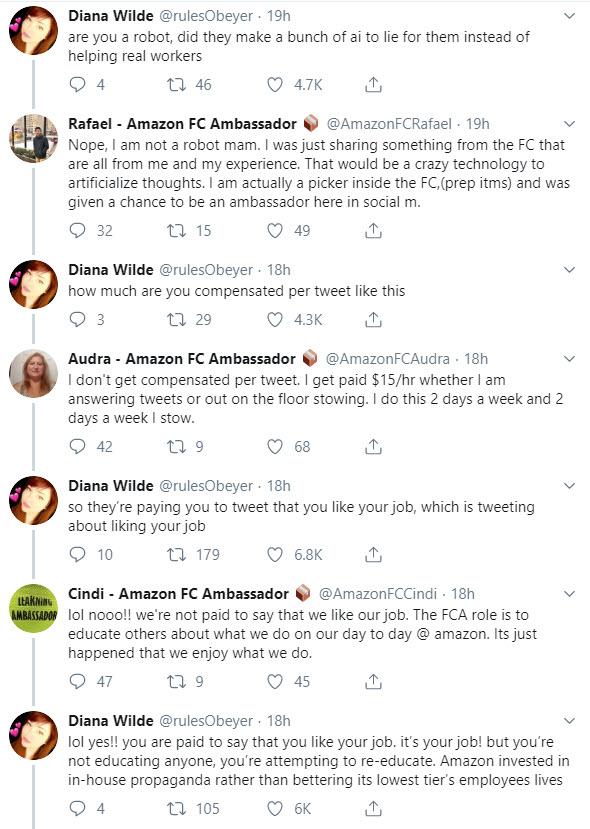After years of ridicule and harsh press coverage, Amazon has finally disbanded its Twitter army. Part of a perplexing guerrilla PR campaign, the Amazon FC Ambassadors were a group of Twitter accounts belonging to employees who were paid to respond to posts criticizing the company. The Financial Times reports that Amazon pulled the plug on the project late last year and wiped all traces of its existence from Twitter because senior executives were disappointed by its reach.
More than a dozen Amazon FC Ambassador first appeared on Twitter in 2018 in the wake of media investigations finding that fulfillment center employees were being overworked to the point of having to urinate in bottles in order to achieve productivity targets. At the same time, Vermont Sen. Bernie Sanders had been highlighting the income disparity between then-CEO Jeff Bezos and the median Amazon employee. In the first weeks of the program, the FC Ambassadors spent much of their time replying to critical tweets and claiming that they had adequate bathroom breaks and generous pay and benefits. For instance, an ambassador named Carlotta wrote, “Did you know that Amazon pays warehouse workers 30% more than other retailers? I feel proud to work for Amazon - they’ve taken good care of me. Much better than some of my previous employers.” Their posts parroted the same talking points, down to the phrasing and particular statistics. The ambassadors also went to great lengths to prove to skeptics that they were real people, not bots, by posting their job titles, the locations of their warehouses, and selfies. They urged critics to take fulfillment-center tours, which Amazon had set up to counteract negative press about working conditions. Spoof accounts impersonating Amazon FC Ambassadors also emerged to make fun of the program and skewer the company’s treatment of its workers. Twitter ended up banning a number of them.
AdvertisementAdvertisementAdvertisementAdvertisementAfter the initial wave of press reports and Amazon critics needling them on Twitter, the FC Ambassadors plodded along in spreading positive testimonies about workplace conditions and getting into squabbles with random users. The focus of their activity appeared to take a turn in 2019 amid a campaign to unionize Amazon’s New York City retail workers. Although the ambassadors had always been Amazon’s biggest cheerleaders, they typically tried to mask their corporate propaganda as neutral fact checks based on their own experiences working at the company’s warehouses up to that point. When it came to the prospect of labor organizing, though, the accounts became more clearly opinionated, with ambassadors arguing that unions breed laziness and cronyism. They repeated common anti-union talking points about how employees who wanted to exercise their collective bargaining rights should just work elsewhere, and about how there was no need for such organizing because the benefits and pay were so great already. None of them advocated for a union. Amazon claimed that it had not asked the ambassadors to speak out against unions; doing so would likely have violated labor laws.
AdvertisementAdvertisement
Over the years, more and more has been revealed about the inner workings of the FC Ambassador program. Employees could become ambassadors by applying to the program or being selected by a manager for having a good sense of humor. Newer employees were often chosen, because managers saw them as more enthusiastic. Ambassadors would spend a portion of their work day posting on Twitter instead of doing their regular jobs like picking or packaging. Those who were part of the program would complete months-long rotations of Twitter posting before giving their handles to the next ambassador to commandeer. Other employees told the press that ambassadors received gift cards and extra breaks and days off, though Amazon has denied providing such perks. The Intercept obtained internal documents in 2021 containing more information about the program, including directives that higher-ups were giving to ambassadors. The company advised ambassadors to reply to “speculation and false assertions” in a “polite—but blunt” manner, and to ground their messaging in their personal experiences in the workplace. Amazon also apparently forbade ambassadors from responding to calls to unionize and answering inquiries from the media. (FC Ambassadors have directly answered a number of my questions that I sent on Twitter over the years, so it’s unclear how this policy was enforced.)
AdvertisementAdvertisementAdvertisementAmazon has long struggled to modulate its tactics and tone on social media. The corporate social media accounts will often awkwardly shift from posting mundane promotions of the company to belligerently attacking its critics. In the final days of the union election at the fulfillment center in Bessemer, Alabama, Amazon’s PR team used official Twitter accounts to pick fights. The @amazonnews account in particular accused Wisconsin Rep. Mark Pocan of spreading misinformation, and Vice reporter Lauren Kaori Gurley of being a “self-interested” critic. The account tangled with Massachusetts Sen. Elizabeth Warren, insinuating that her antitrust platform was a veiled attempt to “to break up an American company so that they can’t criticize her anymore.” Dave Clark, Amazon’s CEO of worldwide consumer, also tweeted that his company was more progressive than Sen. Sanders.
It later came out that Bezos himself had personally pushed executives to more aggressively defend the company. And unlike the FC Ambassadors, the c-suite ambassadors are still tweeting.
TweetShareComment



